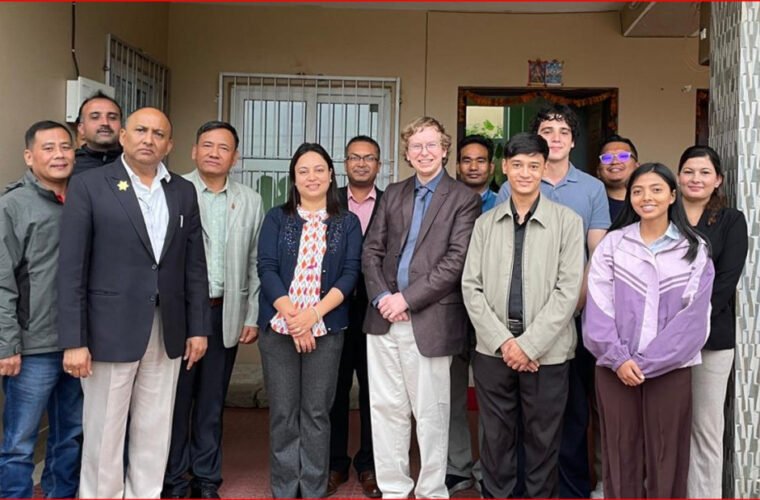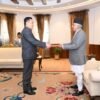Kathmandu, Oct 28: The Nepal Institute for International Cooperation and Engagement (NIICE) organized a public lecture on “Rising Power Competition: Indian and Chinese Commercial Landscapes in the Indo-Pacific”.
The event was held on Monday at the NIICE Seminar Hall, Hattiban, Lalitpur.
The lecture was delivered by Mr. Daniel Loebell, PhD Candidate in Political Science at Northwestern University, USA, who emphasized how the strategic and economic rivalry between India and China is reshaping the Indo-Pacific region and influencing smaller South Asian states, including Nepal and Malaysia.
In the opening remarks, Bibek Dhoj Thapa, Program Coordinator at NIICE, clarified about why NIICE is researching in the Indo-Pacific framework referring to research undertaken by Dr Pramod Jaiswal, Research Director of NIICE.
Thapa argued that the Indo-Pacific is not limited to coastal and island nations but represents a broader framework that affects states in the Himalayan region as well. He said that Nepal can be viewed as a “virtual maritime country” because of its open border with India and its affiliation with BIMSTEC, which provides access to the Indian Ocean.
Further, the competition between India and China in the waters of Indo-Pacific showed spillover effects of competition between the two in the Himalayan region where Nepal is situated as well.
He observed that as India strengthens its maritime partnerships, particularly with the United States, China has adopted a more assertive posture along their shared Himalayan border.
“Tensions in the Indo-Pacific waters are mirrored in the Himalayas,” he noted, emphasizing that the Himalayan region and the Indian Ocean are interlinked arenas of great-power competition.
Reflecting on his fieldwork in Nepal, Mr Loebell shared insights from over 40 semi-structured interviews with individuals from government, academia, and the private sector.
According to him, his preliminary findings indicate that India’s commercial and institutional influence in Nepal remains more pervasive than China’s, especially in trade, investment, and nonprofit exchanges. He noted that such patterns demonstrate how small states navigate complex economic pressures from multiple regional powers.
He further discussed how Nepal’s position between India and China allows it to serve as a strategic observation point for scholars studying the balance of power in South Asia. Loebell described his research as “exploratory fieldwork on how small states hedge between large powers to protect their sovereignty while engaging economically.”
Daniel Loebell chose Nepal and Malaysia for his research to explore how both countries, despite their significant economic differences, share historical and geopolitical connections with both China and India before the British Colonial era in the region.
He highlights that Nepal’s position between northern India and Tibet fostered centuries of cultural, trade, and migratory interactions, further shaped by the British colonial era and restrictions under the Rana regime that pushed Nepalis abroad, including to Malaysia.
Malaysia, on the other hand, presents an older layer of trans-regional engagement, tracing back nearly 900 years to the Kedah city-state, which was linked to China through the Chola Empire of Tamil Nadu. Historical trade networks, such as the “Group of 500” merchants managing spice and raw material exchanges across the Indian Ocean to China, demonstrate early globalization patterns.
Loebell also credited the “Northwestern Buffett Institute for International Studies” for their support in facilitating his research and fieldwork across South Asia, including lectures in Sri Lanka, India, and now Nepal.
He concluded by highlighting the importance of academic collaboration between Nepali and international institutions to better understand the shifting political economy of the region.
The programme was attended by around 20 participants, including researchers, academics, diplomats, students from various universities and think tanks. The session concluded with an interactive Q&A, where participants discussed Nepal’s and Malaysia’s strategic opportunities within the broader Indo-Pacific discourse.





